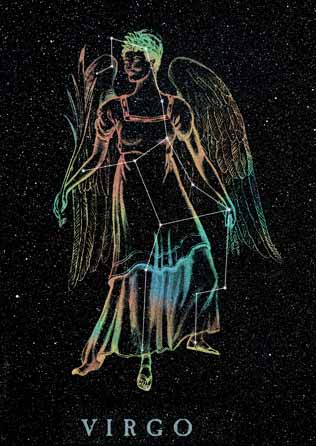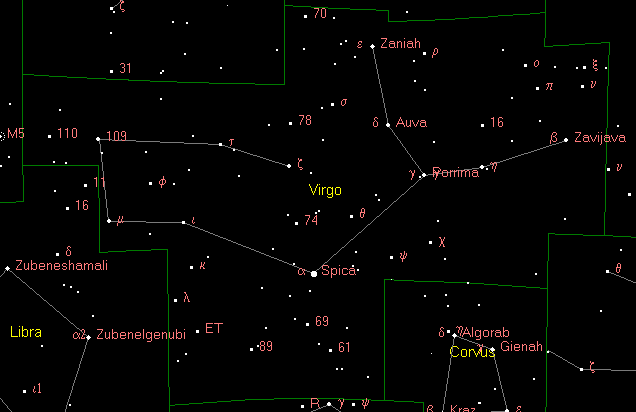
August 22 - September 22
Virgo is an Earth Sign
Virgo is a Mutable Sign

Virgo is ruled byMercury

August 22 - September 22
Virgo is an Earth Sign
Virgo is a Mutable Sign

Virgo is ruled byMercury

Virgo is the sixth astrological sign in the Zodiac. It spans the 150-180th degree of the zodiac, between 152.75 and 180 degree of celestial longitude, which the Tropical zodiac the Sun transits this area on average between August 23 to September 22 each year.
In Sidereal astrology, the sun currently transits the constellation of Virgo from September 16th to October 15th. Individuals born during these dates, depending on which system of astrology they subscribe to, may be called Virgos or Virgoans.
Virgo is said to govern the hands, abdomen, intestines, spleen and central nervous system. Illnesses to which its natives are prone include catarrh, cold, coughs, pleurisies, pneumonia and nervous instabilities. Their natures make them inclined to worry and this makes them vulnerable to stomach and bowel troubles, including colic and ulcers. Male Virgos may have trouble with their sexual organs. Both sexes are strongly interested in drugs and esoteric cuisine and as their delicate stomachs require them to be careful about their diet, it is essential that they treat their fascination with exotic food with extreme care.
Positive Traits:
Modest and shy
Meticulous and reliable
Practical and diligent
Intelligent and analytical
Negative Traits:
Fussy and a worrier
Overcritical and harsh
Perfectionist and conservative
Virgo is the only zodiac sign represented by a female. It is sometimes thought of as a potentially creative girl, delicately lovely; sometimes as a somewhat older woman, intelligent but rather pedantic and spinsterish.
The latter impression is sometimes confirmed by the Virgo preciseness, refinement, fastidious love of cleanliness, hygiene and good order, conventionality and aristocratic attitude of reserve. They are usually observant, shrewd, critically inclined, judicious, patient, practical supporters of the status quo, and tend toward conservatism in all departments of life. On the surface they are emotionally cold, and sometimes this goes deeper, for their habit of suppressing their natural kindness may in the end cause it to atrophy, with the result that they shrink from committing themselves to friendship, make few relationships, and those they do make they are careful to keep superficial.
But the outward lack of feeling may, in some individuals born under this sign, conceal too much emotion, to which they are afraid of giving way because they do not trust others, nor do they have confidence in themselves and their judgments. This is because they are conscious of certain shortcomings in themselves of worldliness, of practicality, of sophistication and of outgoingness. So they bring the art of self concealment to a high pitch, hiding their apprehensiveness about themselves and their often considerable sympathy with other people under a mantle of matter-of-factness and undemonstrative, quiet reserve. They are still waters that run deep. Yet in their unassuming, outwardly cheerful and agreeable fashion, they can be sensible, discreet, well spoken, wise and witty, with a good understanding of other people's problems which they can tackle with a practicality not always evident in their own personal relationships.
Both sexes have considerable charm and dignity, which make some male Virgos appear effeminate when they are not. In marriage they can be genuinely affectionate, making good spouses and parents, but their love making is a perfection of technique rather than the expression of desire, and they must be careful not to mate with a partner whose sex drive requires a passion they cannot match.
They are intellectually enquiring, methodical and logical, studious and teachable. They combine mental ingenuity with the ability to produce a clear analysis of the most complicated problems. They have an excellent eye for detail but they may be so meticulous that they neglect larger issues. Also, although they are realists, they may slow down projects by being too exact. They are practical with their hands, good technicians and have genuine inventive talents,
Thoroughness, hard work and conscientiousness are their hallmarks, and they are such perfectionists that, if things go wrong, they are easily discouraged. Because of their ability to see every angle of a many-sided question, they are unhappy with abstract theorizing. Appreciating the many different points of view as they do, they find philosophical concepts difficult, and they vacillate and have no confidence in any conclusions at which they arrive.
With these qualities, they are better as subordinates than leaders. Responsibility irks them and they often lack the breadth of strategic vision that a leader needs Virgos are essentially tacticians, admirable in the attainment of limited objectives. Their self distrust is something they project on to other people and tends to make them exacting employers, though in the demands they make on those under them they temper this attitude with justice.
They have potential abilities in the arts, sciences and languages. Language especially they use correctly, clearly, consciously and formally, as grammarians and etymologists rather than for literary interests, yet they are likely to have a good memory for apt quotations. Although they are well suited for careers in machine drawing, surveying and similar occupations, they are better fitted for a job in a library or office than a workshop.
Their minds are such that they need the stimulus of practical problems to be solved rather than the mere routine or working to set specifications that need no thought. They are careful with money and their interest in statistics makes them excellent bookkeepers and accountants. They also make good editors, physicists and analytical chemists. They may also find success as welfare workers, ministering to those less fortunate than themselves. They can be doctors, nurses, psychologists, teachers, confidential secretaries, technologists, inspectors, musicians, critics, public speakers and writers especially of reference works such as dictionaries and encyclopedias.
Both sexes have a deep interest in history, a feature recognized by astrological authorities for at least two hundred years. If they go in for a business career their shrewdness and analytical ingenuity could tempt them into dishonesty, though they usually have enough moral sense to resist temptation. Female Virgos may find a career in fashion, for they have a flair for dress, in which they can be trend setters. In any profession they choose the natives of this sign readily assimilate new ideas, but always with caution, conserving what they consider worth keeping from the past. They love country life but are unlikely to make good farmers, unless they can contrive to carry out their work without outraging their sense of hygiene and cleanliness.
Their faults, as is usual with all zodiacal types, are the extremes of their virtues. Fastidious reticence and modesty become old-maidishness and persnicketiness; balanced criticism becomes carping and nagging; and concern for detail becomes overspecialization. Virgoans are liable to indecision in wider issues and this can become chronic, turning molehills of minor difficulties into Himalayas of crisis. Their prudence can become guile and their carefulness, turned in on themselves, can produce worriers and hypochondriacs.

Virgo is the second-largest constellation in the sky. With 26 known exoplanets orbiting around 20 stars in this constellation, Virgo has more confirmed exoplanets than any other constellation. 8 planets in this constellation were discovered in 2009, which is the most planets discovered in a single constellation in a single year.
According to the Babylonian Mul.Apin, which dates between 1000 BC and 686 BC, this constellation was known as "The Furrow", representing the goddess Shala's ear of grain or corn. One star in this constellation, Spica, retains this tradition as it is Latin for "ear of grain", one of the major products of the Mesopotamian furrow.
The constellation was also known as AB.SIN and absinnu. For this reason the constellation became associated with fertility. According to Gavin White the figure of Virgo corresponds to two Babylonian constellations - the 'Furrow' in the eastern sector of Virgo and the 'Frond of Erua' in the western sector. The Frond of Erua was depicted as a goddess holding a palm-frond - a motif that still occasionally appears in much later depictions of Virgo.
The Greeks and Romans associated Virgo with their goddess of wheat, Demeter-Ceres who is the mother of Persephone-Proserpina. Alternatively, she was sometimes identified as the virgin goddess Iustitia or Astraea, holding the scales of justice in her hand as the constellation Libra. In the Middle Ages, Virgo was sometimes associated with the Blessed Virgin Mary.
Virgo is depicted as an angel with wings, holding an ear of wheat. She is usually identified as Dike, the goddess of justice, who was the daughter of Zeus and Themis.
She lived on Earth during the Golden Age of mankind. This was a time of peace and happiness where it was always springtime and food grew without cultivation and humans never grew old. The men lived like gods, not knowing work, sorrow or war.
Zeus overthrew his father, Cronus, on Olympus and the Silver Age began. Zeus was a harsh and strict ruler during these times, as many new rulers tend to be. He saw humans as rather lowly creatures who were far beneath immortals, and in fact should be treated as animals. He shortened spring time and introduced the yearly cycle of seasons.
People during this time became quarrelsome and no longer honored the gods. Virgo longed for the Golden Age times and assembled the human race together and spoke sternly to them about changing their ways. She warned them that worse was to come. Afterwards, she spread her wings and took refuge in the mountains, turning her back on mankind.
The Age of Bronze and Iron fell upon mankind. Humans descended into violence, theft and war. Virgo could no longer bear the sins of humanity and abandoned the Earth and flew up to heaven. To this day, she sits next to the constellation of Libra, which is seen as the scales of justice.
Prometheus, a Titan, became the protector of men and sided against Zeus. He even went so far as to steal fire from the Olympians and give it to humans. Outraged, Zeus chained Prometheus to the top of the Caucasus Mountains, intending to leave him there forever. However, Zeus was not finished punishing Prometheus -- or the human race -- yet.
He sent down Pandora, the first woman. Ancient Greeks believed that women were the source of all evil and discomfort. The symbolic representation of women's corruption of humanity is Pandora's Box, which was filled with all the demons which torture humanity, from Greed to Spite. After Pandora unleashed these demons, the remaining immortals on earth quickly departed for Olympus. The last one to leave was Astraea, the daughter of Zeus and Themis. She was also the sister of Pudicitia, or Modesty. Astraea was the goddess of virtue. Although she went to the heavens, she still hopes to return to earth, and she watches from the sky every night to see when earth will be ready for her to return.

Virgo Transition